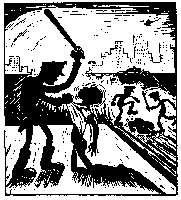"See, in my line of work you got to keep repeating things over and over and over again for the truth to sink in, to kind of catapult the propaganda." -- George Bush, "President Participates in Social Security Conversation in New York," May 24, 2005.
Norman Solomon's latest work, "War Made Easy: How Presidents and Pundits Keep Spinning Us to Death" is a must-read for those whose brain cells have been numbed by the constant drivel of the mainstream news media. In this book, Solomon dissects the time-proven slogans and propaganda techniques that have been used by Administration after Administration to -- in effect -- motivate the American people against themselves and their own best interests -- not to mention those of citizens in many other nations.
You've heard it all before, and you will no doubt hear it again. "Our leaders will do everything they can to avoid war." "They attacked us." "Our enemy is a modern-day Hitler." "This is all about human rights." And, at some point after these and other pronouncements had echoed through the media for weeks or months, American troops marched into Vietnam, Panama, or Iraq. Since the mid- 1960s, American presidents have developed, refined, and perfected powerful propaganda machines for leading the nation to war. Greg Palast ( author of another highy-recommended book, " The Best Democracy Money Can Buy" --http://www.workingforchange.com/article.cfm?itemid=15352) makes a fantastic recommendation: " Read one passage each night to your children to protect them from the brain-snatchers and dummy-fication zombies of America's news media of the living dead."
Alternet has posted the audio online as an MP3 that can be downloaded or listened to online.
-MixMasterE














